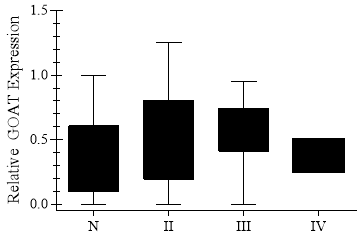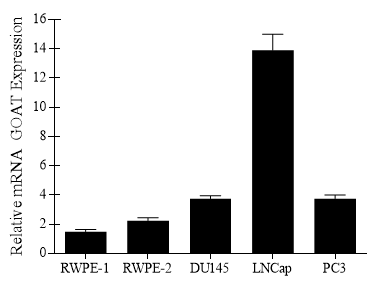P605
Ghrelin, a peptide hormone commonly found in the stomach, is heavily involved in immune, cardiovascular, and reproductive functions of the body. In multiple studies, ghrelin has been observed in cancers of the breast and lung. To determine whether ghrelin is also present in prostate cancer, a study was conducted to explore its activity in cells and tissues derived from normal prostates and prostates afflicted with cancer.
First, normal and prostate cancer tissues that varied by stage were tested for the presence of the enzyme ghrelin O-acyltransferase (GOAT), which converts an inactive precursor molecule to ghrelin by acylation. The assessment was performed using quantitative real-time PCR.

Figure 1. Boxplot showing the relative levels of GOAT mRNA expression in human prostate tissues. The level of expression in normal prostate tissue is denoted by N, and prostate cancer tissues are labeled by stages. Sample size for each group, from left to right was: 10, 22, 11, 3.
Next, to examine whether GOAT mRNA is expressed differently by prostate cancers based on their mode of transformation or invasive phenotype, researchers examined the expression of the enzyme in a variety of normal prostate-derived and prostate-cancer cell lines using real-time quantitative PCR. This experiment included two normal prostate-derived cell lines. RWPE-1 is a non-tumorigenic cell line consisting of epithelial cells obtained from the peripheral zone of a histologically normal adult human prostate that were transfected with a single copy of the human papilloma virus. RWPE-2 is a tumorigenic prostate cell line that was derived from RWPE-1 cells following transformation with Ki-ras using the Kirsten murine sarcoma virus. These two cell lines were compared to three different lineages of conventionally-used prostate cancer cell lines. The three lineages vary in metastatic potential with PC3 cells having high metastatic potential compared to DU145 cells which have a moderate metastatic potential and to LNCaP cells which have low metastatic potential.

Figure 2. mRNA expression levels of prostate cancer cell lines.
.
Find an error? Take a screenshot, email it to us at error@mytestingsolution.com, and we’ll send you $3!
